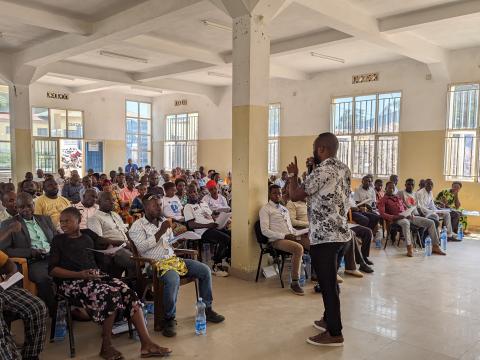DR Congo: Faith Leaders And Health Workers Trained In Polio Surveillance In Their Communities And Ready To Serve

King Mukama, SBCC Coordinator
As part of the strengthening of the Global Polio Eradication Initiative and the fight against other vaccine-preventable diseases, the CORE Group Partners Project (CGPP) in the DRC through World Vision International in the DRC, with funding from USAID, organised training for community relays, health providers, traditional healers, and church pastors in the health zones of Uvira and Nundu, located in the province of South Kivu, in the Democratic Republic of Congo (DRC).
This training marked a crucial stage for the CGPP project, building the capacity of 123 community relays, 25 supervisors, 12 faith leaders, and 11 traditional healers in the Uvira health zone and 113 community relays, 26 supervisors, 12 faith leaders, and 11 conventional healers in the Nundu health zone. The training aimed to equip these key players with the skills they need to carry out effective community surveillance for polio, other vaccine-preventable diseases, and zoonoses.
Capacity-building for community volunteers
Community relays, faith leaders and traditional healers, who are key players in social mobilisation in their communities, were trained in several aspects, including:
- Communication techniques for changing social behaviour
- Acute flaccid paralysis (AFP) case definition
- Community involvement and advocacy
- Community surveillance of AFP and other vaccine-preventable diseases
In-depth training for supervisors and healthcare providers
Supervisors and health providers received in-depth training in the following additional technical aspects:
- Organisation of supplementary immunisation activities (SIAs)
- Management of cold chain equipment
- Supervision and monitoring of vaccination campaigns
‘This training has not only equipped us, it has also strengthened our commitment to working together to eradicate polio in our communities,’ said Ms Nzirita Faida, Supervisor at the CEPAC health area in Kalundu, who was trained in Uvira.
Involvement of church pastors and traditional healers
Recognising the crucial role of faith leaders and traditional healers in their communities, the training also included these influential figures. In each health zone, 12 faith leaders and 11 traditional healers were trained to become allies in community polio surveillance. These actors often see patients first, including potential AFP cases. Their training therefore aimed to :
- Collaborate effectively with community relays and health providers/supervisors in the health areas
- Define and identify AFP cases
- Actively seek out, detect and report cases of AFP.
‘In our culture, many people come to us first when they fall ill. Thanks to this training, I've learned to identify the symptoms of diseases like polio. This is a big change for us traditional healers, as we can now play a crucial role in the early detection and notification of AFP cases. I encourage my colleagues to take on this new role for the good of our community’, said Mr Hula Selemani, a traditional healer from the Kalundu health area in the Uvira health zone.
Pastor Munga Malisawa of the I'AMBA health area had this to say:
‘As a pastor, I have always been attentive to the spiritual needs of my community. This training has opened my eyes to another essential aspect of my role: public health. Today, I'm not just a spiritual guide, but also a key player in the fight against polio and other vaccine-preventable diseases. Thanks to this training, I am better equipped to detect and report cases of AFP, and to encourage my community to get vaccinated. I'm convinced that this closer collaboration between the churches and health structures will help to eradicate this disease in our region.’
Community volunteers and supervisor equipment
Following the training, community volunteers and their supervisors received visibility equipment to help them in their tasks on the ground. The equipment includes waistcoats, hats, plastic boots, t-shirts, polo shirts, and badges with clear messages to engage the community in collective action to call for polio eradication, identifying them as actors in community surveillance and community engagement.
A commitment to solidarity to eradicate polio
The training is part of a wider strategy to build local capacity to combat polio and other vaccine-preventable diseases, as well as zoonoses, in the Uvira and Nundu health zones. By empowering these actors at different levels of the community, this training has laid the foundations for more rigorous surveillance and rapid response to AFP cases, which is essential to achieving the ultimate goal of eradicating polio in the DRC.
These concerted efforts and the commitment of community relays, health providers, traditional healers, and pastors represent a ray of hope in the fight against polio in the DRC, bringing the health zones of Uvira and Nundu closer to the effective eradication of polio and other vaccine-preventable diseases and zoonoses.